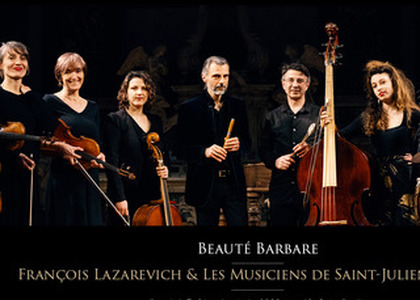> [Archived] Interviews

Interview with flautist François Lazarevich
Radio Hall is hosting, on November 26th, 2023, a concert registered as part of the 18th edition of the Bucharest Old Music Festival. The group "Les Musiciens de Saint Julien" evolves, along with flautist François Lazarevich. He gives us more information about the event in an interview conducted by Sarah Natsis:
Mr. François Lazarevich, have you ever been to Romania before?
Yes, I participated in the same festival in 2019 and also sang at Miercurea Ciuc.
You will perform on the stage of the Radio Hall together with the group "Les Musiciens de Saint Julien", which you founded in 2006. How would you describe the musicians who make up this group? What would be their main attributes?
We are an early music ensemble, and most of us play copies of old instruments.
The theme of the program is quite special, because it focuses on Telemann and is influenced by Polish music and "hanak" music, specific to Moravia. So we will be playing both oldies and traditional music.
Some of the musicians are more specialized in traditional music. For example, we have Iurie Morar on the tambourine, who, even if he lives in France, he is from Moldova. Thus, he knows Romanian and Eastern European traditional music very well.
We also have a percussionist, Pierre Rigopoulos, who plays various percussion instruments. Our soloist has studies in classical music, but also in traditional music, and knows Greek and Eastern European songs very well.
Also, on violin I we have a musician from the Czech Republic who lives in France. He is a good baroque violinist and also knows his traditional music very well.
So, I am glad that I managed to assemble a team of artists who can perform both old and traditional music. And I play a lot of baroque music, but I also know French and Irish traditional music quite well.
The program that you propose to the Bucharest public brings together works signed by Georg Philipp Telemann, but also traditional music from the European space. How did you go about compiling it and how do you come into possession of these forgotten music collections?
First, I read Telemann's autobiography. He wrote three short texts about himself, his own life and his travels in Silesia from 1705 to 1708. During this period he was able to listen to the local musicians and was really impressed by them and their music.
That's how he discovered Polish music and "hanak" music. He listened to large ensembles of violinists and bagpipers. And I, as a bagpipe player, was very attracted and started looking for as much information as possible on this topic.
I read Telemann's "Rostosck" manuscript with Polish songs and the "Uhrovska" manuscript from 1730, which collects many Slovak songs. All this helped me to get an idea of the music that Telemann was able to listen to.
What sound impression do you intend to give to this event, entitled "True Barbarian Beauty"?
The title of the program is a formulation of Telemann himself. He talks about the "barbaric beauty" of Polish music and "hanak". I want to convey its energy, that's why I added some traditional songs, some traditional songs and dances from Poland, from Slovakia, or from Moravia.
I have also integrated traditional songs from Romania, because they are very similar to some of Telemann's creation. And, of course, with Iurie on the tambourine, it would have been a shame not to play such good music.
I think that musically, every piece in the program can captivate.
Translated by Cosmin-Ionuț Petriea,
University of Bucharest, Faculty of Foreign Languages and Literatures, MTTLC, year II
Corrected by Silvia Petrescu














